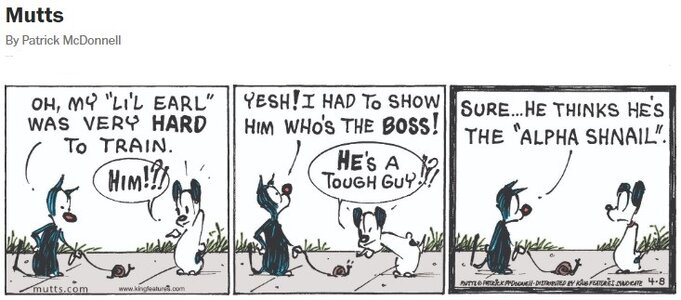heirloomgal
Garden Addicted
- Joined
- Jan 17, 2021
- Messages
- 4,589
- Reaction score
- 14,988
- Points
- 265
- Location
- Northern Ontario, Canada
Very true.
Fear
Very true.
Fear
I hope that's not mei wish i could fix it for a certain person...
Keep hope @Marie2020, it's not an easy road dealing with reactivity but I've met many people have 100% solved it. Even quite severe cases. Almost all the online dog trainers I follow say this is the #1 reason why people seek them out for help. I quite like Cheri Wulff Lucas and she has put out a lot of content regarding this issue, and I like that she is a balanced trainer.https://www.youtube.com/user/cherilucas/videos
My only caution to you would be in regards to using food rewards when dealing with reactivity. You can't reward your dog out of a reactive state of mind. Treats are for integrating a wanted behaviour into your dog, they won't take a bad behaviour out. And if the treats become associated with barking behaviour, you've got an even bigger problem on your hands because they think it's a reward for it.
I (& my dog trainer) used a prong collar on my dog initially, and I can tell you that immediately stopped my dog from fear barking. The reactivity ended in 30 seconds flat, it was instant freedom. But I know not everyone is comfortable with that route, and it is a technical science to use the collar. Without a physical correction, it's a hard behaviour to stop, but if you really focus on building her confidence up that can work wonders too.
Now, after so much training with my dog, when we walk past other reactive dogs being walked, or dogs behind fences barking wildly, he loves it. Their barking actually calms him, because he knows that dog is afraid of him and not the other way around. He walks smugly in contented silence. Don't become a prisoner to your house, the fate of so many dealing with this. Dogs bark to eliminate from the environment what they dislike, and once you start to avoid the things that sets them off, the dog gets affirmed in what it's doing and commits further to it.


I hope that's not me
That has to be tough. How is she with herbivores?Mom's fear of dogs...

That has to be tough. How is she with herbivores?
Poor mother.no, Mom's fear of dogs...she acts like prey which makes it even worse. self-reinforcing cycle. if we go anyplace it is all she can focus on if there are any dogs around. it's hard to carry around ice-cream and donuts to give her a treat to distract her. just not possible. we don't go to parks or out for walks any more. she's very busy with other things so we're not hanging out in public that often. we do have a date coming up to go out and do stuff but i know for sure that if there are any dogs around it will not be a good time until we can get to someplace else. so... that's about how it is going. reactive animals and reactive people... and me trying to be a peaceful observer and just get on with things as quickly and with as little drama as possible.